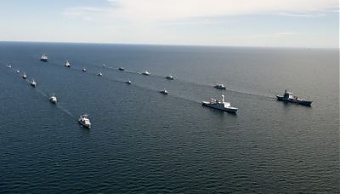Analytics, Direct Speech, Energy, EU – Baltic States, Legislation
International Internet Magazine. Baltic States news & analytics
Sunday, 14.12.2025, 23:30
Increased regional tensions in the Baltic Sea
 Print version
Print version |
|---|
However, as the security policy
situation in the world has continued to change for the worse, this is also the
case for the Baltic Sea region. As a result, Sweden needs to strengthen and
deepen its cooperation with the countries around the Baltic Sea to stabilize
the region. We must also strengthen the Swedish security and defence
capabilities through a Swedish NATO membership and by strengthening our
defences.
For nearly 25 years, states in the
European security system treated each other as sovereign equals and respected
each other’s independence. With its illegal annexation of Crimea and its ill
masked aggressive action in eastern Ukraine, Russia has torn a hole in the
fabric of European security. Russia’s actions in Ukraine are a fundamental
violation of the core principles of the security of Europe. The present
situation in Russia is worrying and very troublesome. As the Russian defence
reform has been implemented, the pattern of Russian military exercises in our
region has changed. They have become more and more complex and have been
carried out in a more aggressive manner which leads to confrontations with
almost all countries around the Baltic Sea. Russian aircraft activity along
NATO’s border has increased. In 2014 and 2015, NATO fighters went up to meet
Russian aircraft more than 400 times, an increase of 70 percent from 2013. The
pressure is particularly hard on Estonia, Latvia and Lithuania. This fall,
Russia is likely to violate the 2011 Vienna Document by conducting several
other exercises simultaneously outside the joint strategic exercise Zapad 2017
with Belarus. This will raise troop numbers substantially above 13 000 and has
been done so in the past. Another big cause of concern is Russia’s rhetoric
regarding its nuclear weapons. According to Swedish researchers, Russian
rhetoric on nuclear weapons has reached levels unthinkable even during the
height of the Cold War. Moreover, Russia has maintained and developed its
arsenal of tactical nuclear weapons, i.e. smaller nuclear weapons suited for
use on the battlefield, unlike the strategic ones intended to erase major
targets, for instance, cities.
The tactical nuclear missiles are no
news. In a recent report, The Swedish Defence Research Agency (FOI) writes that
NATO and The US also have retained their tactical nuclear weapons. The big
change is Russia’s policy. The importance of tactical nuclear weapons in Russia
has increased. A large number of Russian military units have weapon systems
that can be equipped with tactical nuclear warheads. In the military doctrine,
Russia reserves itself the right to carry out preventive nuclear strikes if the
country’s existence is threatened. Russia also reserves itself the right to
face conventional attacks with nuclear weapons. Due to Russia’s actions, the
importance of Sweden’s military strategic position has increased. On the Baltic
Sea, important trade routes go to and from all countries in the region. The
Baltic Sea is also an important arena for receiving and providing military
assistance. We must therefore continue to deepen Nordic cooperation in the
security policy area. We must also cooperate more between the Nordic-Baltic
countries both bilaterally and multilaterally within the EU and the UN.
Cooperation is needed in other areas as well. My party strongly supports
increased trade and energy cooperation in Europe and the European energy union
but not at the cost of deteriorating security and increased dependence on
Russia. The gas pipeline Nord Stream 2 goes against the principles of the
energy union and would result in an increased European dependence of Russian
gas. Sweden and its neighboring countries must put pressure on the EU
Commission to stop Nord Stream 2. When the situation in the Baltic Sea is
becoming more insecure, Sweden must seek further cooperation with the countries
in our immediate vicinity. The importance of the Baltic Sea for trade and other
issues such as the environment in the region cannot be emphasized enough.
Sweden needs to strengthen the security policy cooperation with the countries
around the Baltic Sea in order to restore the stability in the region. At the
same time, we must strengthen Swedish defence capability through a Swedish NATO
membership and by strengthening the Swedish defence.








 «The Baltic Course» Is Sold and Stays in Business!
«The Baltic Course» Is Sold and Stays in Business!

